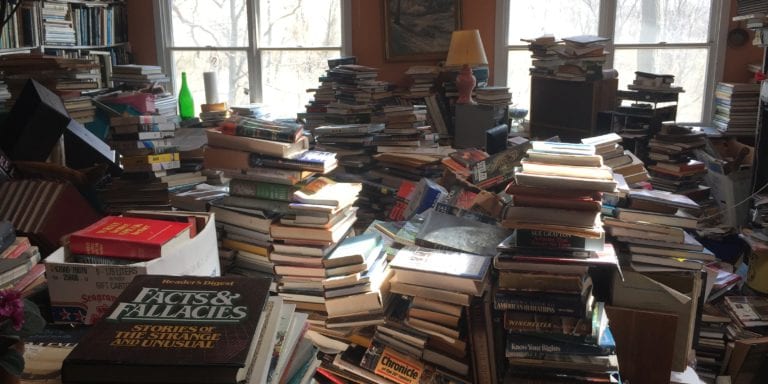
There’s an odd little town in Northern Maryland close to the Mason Dixon Line but not really close to anything else. Though I’ve spent nearly 50 years in Maryland or in Pennsylvania (right ON the Mason Dixon Line) I’d never heard of Manchester.
When I got an email from Kelly, the receptionist here, a few days ago who had taken the call I was intrigued:
Chuck—
I just finished speaking with [XYZ] regarding a rather large collection. Her father has over 50,000 books (Coffee Table, Sci-Fi, Trains, Military, Cooking, Gardening etc.) that need to be removed by April 17th if possible. They are located in Manchester Area (Carroll County.) He recently had a stroke and is in a rehab facility.
I don’t know if this is possible given the short notice.
Her phone is …
Manchester? Why had I never heard of it? I checked it out in an atlas and found it is in a kind of blank zone northwest of Baltimore but not really close to anything. In the central part of Maryland with its booming growth and government driven high standard of living it is difficult for any town to “hide.”
I looked it up on Wikipedia. Here’s an excerpt:
Manchester is a small incorporated town in northeastern Carroll County, Maryland, United States, located just south of the Pennsylvania state line and north of Baltimore. The population was 4,808 at the 2010 census.
Manchester was incorporated in 1833 and is the second oldest incorporated area in Carroll County after Westminster, which was incorporated in 1818. The town was originally formed as a part of Baltimore County, before the creation of Carroll County in 1837. It is governed by an elected mayor and an elected five-person town council.
Manchester lies in the humid continental climate region, marked by cold and snowy winters but humid and hot summers. This climate is ideal for growing farmed crops in the summer such as tomatoes, sweet corn and squash, leaving much of the outlying area marked with large tracts of farmland. Manchester is a rural commuting town where residents travel to work in the greater Baltimore Metropolitan Area and the greater Washington Metropolitan Area….
From the 18th century until the earliest parts of the 20th century, the primary languages spoken by the residents was German, or Pennsylvania Dutch. The custom of the German residents of making noodles and stringing them on lines outside their homes would give the town the nickname “Noodle Doosey.” Later, Manchester would receive another nickname when the German custom of making ginger cakes brought on “Gingercake Town.” Manchester was also a relatively large cigar manufacturing town, from after the Civil War until around 1930, when the mass production of cigars made the manual method in use in the town less economical…
Noodle Doosey?!
And I noticed on the atlas it’s close to the Prettyboy Reservoir. I’m intrigued by fancy names.
50,000 is a lot! And although we are kind of drowning in books right now…well, almost always nowadays…And although we get MANY requests for house calls—more than we can physically get to—I still can’t resist a collection that has that kind of hook: 50,000 books, a town I’d never heard of before, Noodle Doosey and Springtime.
So I called… And called… And called…
“Leave a message after the tone…”
No tone. But I left messages any way.
I called once more the next day and then gave up. I wasn’t getting the beep on the daughter’s voicemail so I wasn’t even sure she was getting my messages. In frustration—I had Kelly try her luck. She got through, and I was finally in touch with her. Her deadline was looming. It might take a number of trips to get 50,000 books. If there were 50,000 books. Peoples’ counts are often way off. Sometimes way high. Some times way low. But if we were going to do this I’d better start the ball rolling.
She called me back finally. She said her father was kind of a hoarder but had agreed to have all the books thrown away while he was away in rehab. She said she felt bad throwing the out. I asked to come out the next day
It is not an easy place to get to from Frederick (or anywhere else.) Just over an hour the route wends its way through mostly small towns and country farms and the first hints of development creeping over from Baltimore and up from Washington.
The route passed through the heart of Westminster Maryland. Now I had heard of that and had made numerous calls there in the past. Newman Press—a Catholic publisher had once had its headquarters there. I’d visited long ago and bought some of their closeout stock. Random House has a legendary mega warehouse for books there. High tech. 50 foot ceilings. Cherry pickers with automated book retrieval systems. I’ve never visited that. Top secret apparently. Westminster looks to be booming and gentrifying due to the spread of people and money from the Baltimore region who want a more idyllic setting. Coffee houses and bakeries and bistros fill the old downtown storefronts that were hardware stores and small groceries and bakeries long ago. We passed through that city of 20,000 souls and were back out in the country.
Then I saw the sign “Welcome to Manchester”—but where’s the city of 5000. The woman who lives in my phone told me where to turn and when, and soon I was approaching the street the house was on. It is a cul-de-sac, and the house was at the very cusp of the circle at the far end. I pulled into the driveway, and that’s when things got weird.
I’ve been to very strange hoarders abodes over the years. There was one in DC where the tenant turned into a squatter in a fine old sandstone house near DuPont Circle. The power and water was off. The windows had all been painted black from the inside. She had books everywhere. Stacked in the sink and bathtub, toilet, closets, every wall… (In case you’re wondering—she used a chamber pot!) But most of those were like new and she didn’t have a whole lot stacked on the floors or steps. Spookily she had a fake body bundled under the covers on the bed. I wasn’t sure why and didn’t ask. I think she had become a squatter after her lease had expired and she just kept living there until. Maybe she was finally be about to be evicted when she called us in. Spooky old house. Packing in the dark.
Another townhouse in Gaithersburg was even more pathologic. To get around I had to walk sideway along paths. The books were stacked everywhere—hip to shoulder high. A narrow path led from the front door to a couch in the living room where the owner slept in a nestlike setup. Another narrow path led to the kitchen—just the fridge was accessible. I had to ascend the steps sideways as well. Books were stacked all the way up leaving just about 10 inches for me to sidle up. Upstairs a single narrow path threaded down the hall and into a bathroom. Only the toilet was not covered with books.
Another hoarder in Annapolis had a double life. He had a gorgeous town house in the old upscale part of town. The downstairs was well kept. He had some leaded glass fronted barrister bookcases with some pretty nice books on them. The furniture was nice. Not too much bric-à-brac. Clean. He took me upstairs and 3 of the four bedrooms were filled with books. FILLED. Solid. About 5 feet high wall to wall. A veritable flood of books on the second floor but only in those rooms. He didn’t want to sell those—just the nice ones in the cases downstairs. Go figure.
There have been plenty of others.
So when I pulled into the driveway off the cul-de-sac the first thing I noticed was a lawn mower in the middle of the yard.
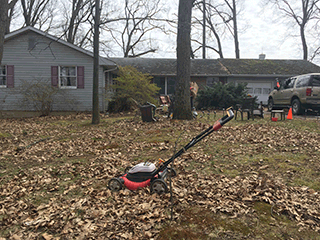
Had it been there 5, 10, 15 years? Your guess is as good as mine. It was an old style electric and I guess the battery ran out one day and it just stayed there—becoming part of the landscape. Toward the end of the driveway were stacks and stacks of plastic tubs—remember this is still outdoors. Nearby a long dead ski mobile rested up against a tree—its plastic tracks rotted away. An old truck that clearly hadn’t moved for years was permanently parked in front of the garage.
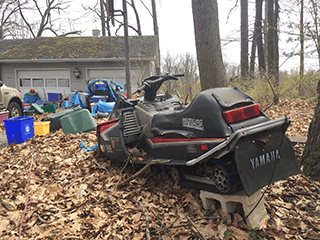
Here’s some advice from one who has seen a lot of waste. Do NOT rent a storage unit for more than a year unless you are actively doing some kind of business or hobby out of it. What ever you’re storing there will soon have any of its value mitigated by years of useless rent payments. And do NOT buy plastic tubs to store stuff—except maybe Christmas ornaments or similar that you’ll unpack every year. Whatever you are putting those $5-10 plastic you almost certainly will never look at again until you move or your heirs have to get rid of them to people like us. We literally get hundreds of plastic tubs and milk crates that people have “saved” their books in every month. We put them out near the street for people to take for free—so they’ll have something to store their stuff in.
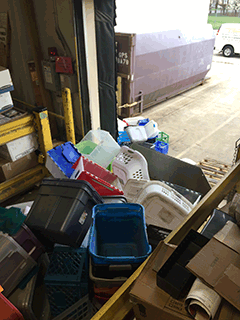
I walked up to the front door. The outdoor entry porch had tubs and crates on either side of the door so there was just enough room to get to the threshold. The daughter opened it for me. Straight ahead was a long bay window looking out into some woods out back. There was a floor to ceiling Lego in the corner and a few other Lego towers on the sill.
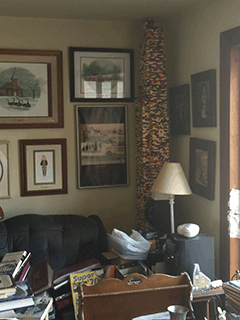
To the right of the window the living room opened up—or it would have if it wasn’t a solid mass of stacked books and other stuff with just a narrow path to some built in bookcases in the far wall. From there you turned left into a den. The daughter called it a library. Indeed along its far wall a pretty nice floor to ceiling bookcase was filled with row after row of nice coffee table Abrams and Rizzoli etc. art and design books. In the old days they would have been worth 75 bucks apiece and up. Now—most of them go to Interior Designers—by the foot.
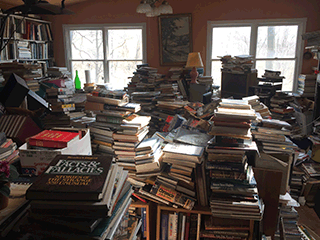
Between me and that far wall was another solid mass of books about 5 feet high. There was a narrow path around the perimeter of the room to the nice books on the far wall. A single shelf of books ran along the nearer wall a foot or so above the top of the doorway and windows leading outside. Part of it sagged precariously.
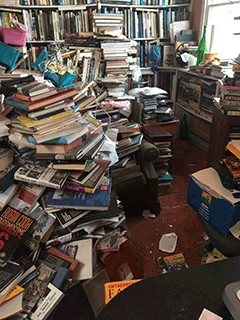
A neighbor who wandered in cautioned: “I wouldn’t stand underneath that. Looks like it could fall anytime.”
He appeared I suppose to support the daughter, but his main function to offer advice, comments, unfunny jokes and general annoyance to me.
She led me through the rest of the house. The hallways were lined with stacks of books…and CDs and DVDs on both sides.
We got to the master bedroom and clothes were strewn all over the floor. The bed was about 80% covered with a sprawl of books.
A bony tabby cat appeared and softly yowled up at me. It looked so sad and lonely.
Depressing, sad, pathetic, pathological…I was overwhelmed. My business sense, my cynicism was being swamped by the human tragedy here.
“There are a lot more in the basement but we can’t get down there from inside.”
So I was led out the front door and around to the back through the yard. We passed all manner of debris on the grass and dirt and in the bushes and amongst the trees until we got to a dozen or so cement steps leading down into the earth. The sunken structure held a lot of dry brown leaves—mostly oak—so much so that the lower half of the stairwell was nearly full of them. The daughter stepped down gingerly testing where the next step should be.
“I haven’t been down here for 10 years I bet.”
She unlocked the door and when it opened an invisible cold damp cloud of mold and mildew floated up the stairwell engulfing us all.
Hopeless I was sure as far books. But still it is worth a look. Who knows what else could be down there?
Junk sprawled everywhere. Rusted shovels and pick axes leaned against a wall. The old fashioned custom of nailing the metal screw tops of jars to the ceiling joist and twisting in the jars in to hold all manner of nuts, bolts screws, little stuff. It is free out-of-the-way storage and instantly visible as well. But I don’t think anyone does that any more. About 40 jelly, peanut butter, pickle and mayonnaise jars hung like squat glass stalactites from above. Dim hulks and mounds of sad dead objects were everywhere.
“The books are over here.”
The neighbor was at my shoulder.
“Boy, if you got a dollar for every book that would be a pretty good haul.”
It wasn’t the last time he was to offer that sage advice.
Indeed there was a long wall of rustic homemade pine shelves from floor to ceiling. Maybe 20 feet long and 7 feet high and completely filled with old hardcover books.
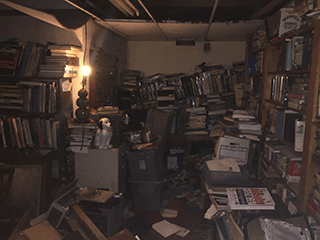
I knew, but I reached to pull one off anyway. Five more resisted coming off with that one as they were all fused together by the mold and dampness.
“These are too far gone for us to take I’m afraid.”
“Well, there’s another room over here—it was his office. They should be better.’
She slipped her hand behind a row of books and searched for the light switch. It took a little while, but she finally found it and a bare bulb in the ceiling illuminated the sad scene. 4 walls of books. Books piled on the floor. Books on the desk and tables and chairs.
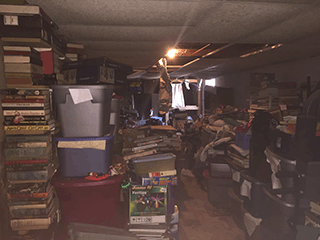
Tragic.
I went through the motions of spot checking books here and there and although they weren’t as fused together as the other—looking under the dust jackets there was mold and mildew on every one. I often do the “smell test” on books in basements to see if they still have that musty odor even if there’s no obvious moisture damage to them. It was impossible here. The stench in the basement overwhelmed any scent any individual book might have.
“I’m afraid these are gone as well. I don’t need to see anymore down here.”
We cautiously ascend the leaf covered steps up into the Spring moving daylight and luscious fresh air.
“There are more over here.”
We walked around a corner and a bank of 8 storage sheds appeared. Amongst and around the sheds were more plastic tubs and more “things.” Boxes of old light blue glass canning jars. Old glass insulators—things people might actually want were amongst rotting boxes and pieces of equipment. She unlocked one shed and in we went. The walls were lined with bookcases and a double row went down the center making it so you had to turn sideways to get along the bookcases. At the far end there was a desk and chair. Somehow these books were dry and not musty or anything. I looked under dust jackets and there was no spotting or fuzz. The problem here would be how to get them out to the front. The yard is mostly woodland and the ground therefore dirt. Because of all the obstacles driving back here would be problematic. Putting them on hand trucks and rolling them out front would be bumpy and awkward and a long slog.
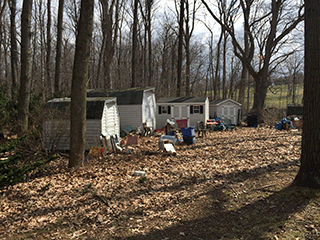
This is likely where I made my big mistake. I was overwhelmed by the sadness and pathology and bibliotragedy. I didn’t look closely. I didn’t inspect them for the most important aspect of any house call; any collection.
“When do you need these out?”
“My dad is getting out of rehab on…”
The date she gave was 7 days away.
That’s when I made my second big mistake. Compassion.
“I can send 2 vans and 4 guys in two days. We can haul away as many as we can.”
At least I recalled a caution with dealing with ill elderly people who are not present.
“I’ve had experiences where folks have forgotten they’ve given permission for their books to be taken while they’re gone. I’d like you to get a signed note from your dad saying it is ok to take them. It is for both our sakes in case he gets home and gets upset that all the books are gone.”
I had no idea of the mistake I had made until I returned Thursday at noon with Clif and Eric and Nate and two big vans filled with empty boxes. The cold damp spring of 2018 had finally given up, and the sun was out. The temperature had risen from the high 30s that morning to about 60. By the time we left 2 and a half hours later it was in the 70s.
We backed one van up the long driveway to about 10 feet from the dead truck.
“Let’s get all the boxes to the front door.”
Clif asked: ” Can we move some of the solar lights to get a clearer path?”
That’s when I noticed there dozens and dozens of the little solar powered lights on stakes stuck in the ground all along the driveway and walkway and…everywhere.
We went inside and I had them start with the nearest mound—the living room. I went into the kitchen and dropped to my knees and started packing to open a second route to the far end of the living room and the “library” beyond.
The neighbor appeared in the kitchen and assessed the situation: “Boy, if I had a dollar here for every book in here that would be something!”
After about the 10th box, I arose and went to check on their progress and see what books were getting exposed as layers and layers were removed.
That’s when my big mistake began to hit me—like the dust rising from the piles I packed from the kitchen table and atop the stove and dishwasher—like the stench of mold and mildew rising from the basement door which had been exposed and opened—like the odor of the sad cat’s overflowing litter box I hadn’t seen—or smelled—in the far corner of the kitchen (because that hadn’t been accessible due to all the books in front of it)—my senses were struck by my big mistake.
The books were no good. The condition was ok. The dust would come off as we packed. They were mostly clean. They were dry and odorless. But almost all were coffee table books. Old photo books of nature, places, things…
Coffee table books. They are hard to sell in the stores. Not very profitable in general online because of their size and weight. And our coffee table styles in Books By the Foot are not very popular—except for art and architecture and design.
The neighbor appeared at my shoulder. “I wouldn’t stand under than shelf. It could come down at any time.”
I wandered from room to room. It was the same. We were removing hoards of books we didn’t really need and would be difficult to move in the near and far future.
But we were there. We packed and hauled. We alternately chilled and held our noses inside and sweated and breathed deeply outside.
We had filled one van and backed the other in and were about halfway full when she came to me.
“Would you get the books off his bed in case he comes earlier that we think?”
There was something creepy about that. I felt I shouldn’t delegate that. I’m in charge. I ask folks to do plenty of dirty and grunt work. Some tasks shouldn’t be pushed off. If I’m present, I should be willing to go into the heart of darkness.
I walked in atop the clothes and socks and slippers and sneakers strewn on the floor. I pulled the books off the bed and dropped them into boxes on the floor alongside the bed. When I could no longer reach them I climbed atop the bedspread on my knees and packed there until that distasteful deed was done. I guess for a moment I felt like nurses must when they do “what needs to be done.”
The day was aging. The van was filling. I had to get back to meet my ride to go to the Caps first playoff game all the way down in DC. (They lost as usual in the playoffs, damn it.)
Clif was on his knees packing by the door in the library. I arrived just in time to hear the neighbor tell Clif: “If I had a dollar…Hey, I wouldn’t work under that sagging shelf over the door. You never know…”
“Let’s wrap up and get the last boxes out.”
We had gotten about half the books. Clif and I drove back in one van.
“Why did I do this?” I opined aloud to myself as much to him. “Never again.”
“You did it because you have a heart in there somewhere.”
That’s my book muse speaking to me alone. It’s rare she tries to make me feel better.
“They’re crap. Waste of time. I don’t know the guy or his family. They’ll have to have junkers come in and haul all the detritus away any way. These books could be hauled by them as well,” I thought aloud.
“You have a heart for the books and the people who collect them. Even those who sicknesses have taken control of their minds.”
The boxes stacked to the roof of the van loomed behind me—in the back of the van.
“You may be surprised. Time will tell. And I’ll tell you there are some ringers packed behind you.”
“Waste of time. I’m filthy. I’ve created a lot of VERY marginal work for people at the warehouse.”
“You may be surprised. It may be in the short term. Maybe in the longer term. Maybe in the far future when all accounts are reckoned.”
“Never again,” I grumbled to myself and Clif, bemused beside me.
I pulled my laptop out from between the seats and began pecking away at this story as Clif drove through the Maryland countryside. I looked out at all the swaths of daffodils that seemed to garland our route.
“This heat will wilt the older blossoms,” I thought. “Still this chill spring has extended the life of so many. I’ll need to get out on the mountain and mark spots where I should plant more next fall.”
I’ve planted thousands up there over the last 9 years.
The daughter texted me: “Thank so, so much. Dad will be home Tuesday. Can you come back Friday, Saturday or Monday?”
I texted back: “We’ll be back Monday morning and take as much as we can.”


This was clearly a testament to your ability to care, in addition to your ability to write some great accounts of book journeys.
That’s an old story Victoria!
Thanks for reminding me about it.
I really appreciate your writing and thank you for the compliment!
Best
Chuck